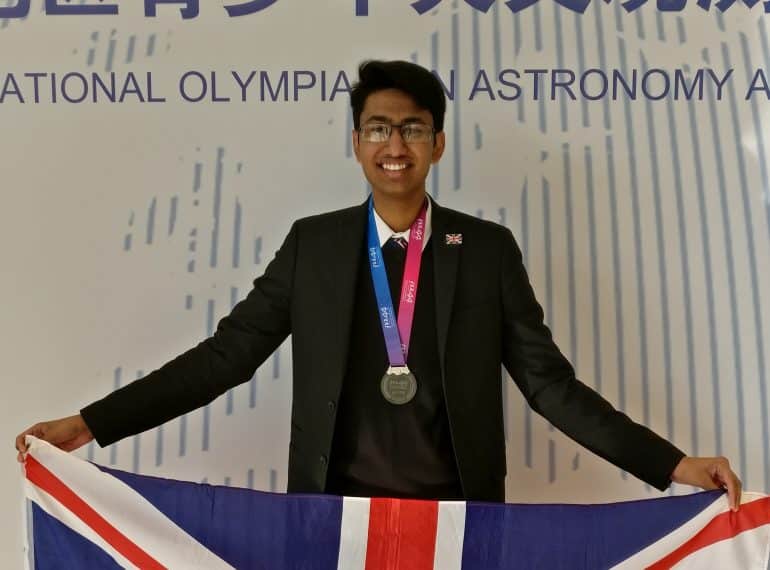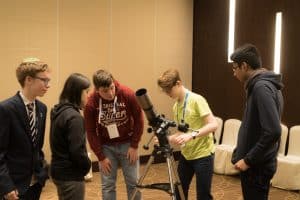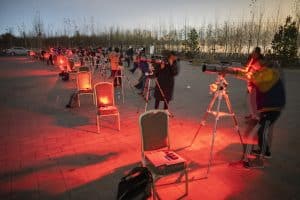
Year 13 pupil Niam Vaishnav won one of the UK’s two silver medals at the International Astronomy and Astrophysics Olympiad in Beijing.
His performance during the fiercely fought competition put him in the top third of the competitors, placing Niam among the world’s foremost young astrophysicists.
 Headmaster Neil Enright said: “I congratulate Niam on his achievement and on the honour he has brought both to the School and to the country. He combined deep understanding and extensive factual knowledge with profound academic curiosity, thus exemplifying the free-thinking scholarship that we seek to cultivate at QE.
Headmaster Neil Enright said: “I congratulate Niam on his achievement and on the honour he has brought both to the School and to the country. He combined deep understanding and extensive factual knowledge with profound academic curiosity, thus exemplifying the free-thinking scholarship that we seek to cultivate at QE.
“While he is undoubtedly a talented young man, his success is the result of a great deal of hard work and he should therefore be very proud of his medal.”
Royal Astronomical Society Vice President Charles Barclay also congratulated the UK competitors: “This year the competition was particularly tough…and we are delighted with the result from this young team of five 17-year-olds.”
Although he enjoyed the competition itself, Niam says the highlights of the visit for him were meeting people from around the world who shared a common interest in astronomy. “We had lots of fun learning about our different cultures and exchanging card games! We also had the chance to see landmarks in China, such as the Great Wall, which was an amazing experience.”
 Niam won his place on the five-strong national team after excelling at the British Astronomy & Astrophysics Training Camp at Oxford at Easter. His subsequent training included a spell at Marlborough College’s observatory.
Niam won his place on the five-strong national team after excelling at the British Astronomy & Astrophysics Training Camp at Oxford at Easter. His subsequent training included a spell at Marlborough College’s observatory.
He travelled with British delegates to Beijing, where he teamed up with other competitors from countries spanning the globe, including Nepal, Greece, Poland, Canada, Bolivia and Singapore. Niam and his fellow competitors stayed in the mountains near to the Great Wall.
The competition involved four tests: a five-hour theory examination, a five-hour data-analysis examination, a one-hour daytime observation round and a ten-minute night-time observation round, during which competitors could use telescopes. There was also a separate team competition in which Niam joined six people from different countries.
“The problems were tough but very interesting, with topics ranging from cosmology and dark matter to binary stars and the energy output of the sun,” he said. “Our knowledge of the sky was also tested: we were asked to recognise constellations and Messier objects [a set of 110 astronomical objects, of which 103 were included in lists published by 18th-century French astronomer Charles Messier].”
 The aspects of the competition itself that stood out most for him were the questions looking into the evolution of the universe and of large-scale structures within it, as well as those which sought to answer the “big questions”, exploring the nexus at which elements of physics and philosophy merge.
The aspects of the competition itself that stood out most for him were the questions looking into the evolution of the universe and of large-scale structures within it, as well as those which sought to answer the “big questions”, exploring the nexus at which elements of physics and philosophy merge.
The UK won two silver medals and received two ‘honourable mentions’. For a gold medal, a score of 78% was needed, for silver it was 68%, for bronze 56% and for an ‘honourable mention’ 44%.
“Overall it was an amazing experience that I will never forget, and I have made some lifelong friends from many different countries.”
Niam has already started the process for the Physics Olympiad competition next year, with Round 1 already complete, and Round 2 taking place in January.
